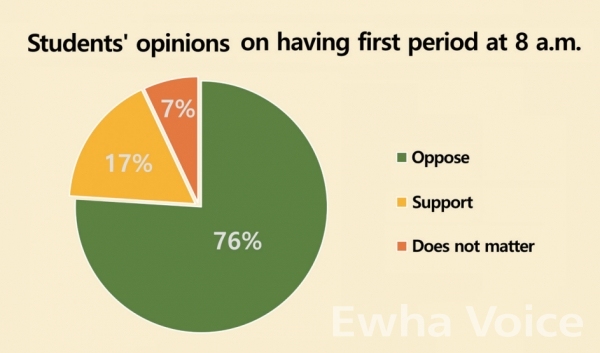
It is an old tradition of Ewha to start the first period at 8 a.m., which is an hour earlier than every other university in South Korea. However, the fundamental question is left unanswered. Is starting school at 8 a.m. necessary?
Throughout the years, students of Ewha have consistently expressed their concerns and hardships regarding the early time of first period classes on the college student community application “Everytime” and the educational community website “Orbi.”
For a more accurate representation of students’ views on Ewha’s timetable, Ewha Voice conducted an online survey of 56 Ewha students from Feb. 26 to March 6. In response, 76 percent of respondents opposed having first period at 8 a.m. Nearly all respondents claimed that the early class time caused physical fatigue. Furthermore, 27 percent of respondents amongst those who had taken first period classes were extremely dissatisfied with the lecture time.
Half of the respondents shared that they spent their time after class recharging through rest and naps, while only 23 percent replied that they carried out other plans such as part-time jobs and extracurricular activities. Notably, when questioned on the more desired time period of the same class, 94 percent of respondents preferred other periods to the first period.
Choi Hye-jung, a senior from the Department of Social Studies Education, was one of many who commuted to school using public transportation. She recalled her harsh experience going to 8 a.m. classes in 2020.
Not being a morning person, Choi shared that it was not only difficult to wake up at 5 a.m., but also unhealthy for her as she did not have enough time to eat breakfast. To get to school, she had to pass Jongno-gu, notorious for its commuting crowds in the morning. Most of all, she was not able to have a productive morning as she usually spent her time after class making up for her lack of sleep.
“Every so often, some professors who cared about the well-being of students and understood the sorrows of first period classes would consolestudents,” she said. “Those were the times I really wanted to raise an objection.”
However, Choi added that she was unable to do so as she thought first period classes were an old custom of Ewha that could not be changed.
“Everyone was suffering,” she mentioned. “How could I be the only exception?”
Another detail Choi brought up was that the school shuttle bus taking the main gate local route started operating at 7:50 a.m.. Due to the late operation time, students from dormitories have to walk for approximately 30 minutes to attend first period classes, creating yet another inconvenience.
Choi contended that the current timetable does not acknowledge the students’ life patterns and physical limits. She hopes the school will eliminate the early start time.
On the other hand, Professor Fabio Donati from the Department of Physics regarded the issue of early class times in a different perspective.
He believes the environmental and academic circumstances of Ewha should be considered when deciding on the class time schedule. As an example, the number of classes that should be delivered by the end of the day is one factor that makes Ewha start classes early. Hence, if the first lecture time is delayed, it is inevitable that the last session will end later as well. Donati assumed that the delayed lecture times may not bring positive effects such as the improvement of students’ concentration.
Moreover, Donati argued that the preferred time schedule will differ according to each student’s personal biorhythm and daily activities. Thus, as he mentioned, weighing the choices between starting and ending early or starting and ending late should be a crucial point to be discussed if the timetable is to change.
Considering his own experience with early morning classes, Donati explained that, while he did not face any inconveniences himself, the students who participated in his 9:30 a.m. lectures had contrasting attitudes to those who attended the afternoon sessions.
“The students were less active, more tired-looking and appeared to be less focused during early morning sessions,” Donati said.
As mentioned above, it is no mystery that many students at Ewha struggle with difficulties attending first period classes, one prime example being sleep deprivation.
Due to the early class times, students tend to get less than eight hours of sleep every day, which is the minimum amount of adequate sleep for young adults according to the American Academy of Sleep Medicine and Sleep Foundation.
As hard as it is, seeking out the most suitable academic timetable is an essential task for the school that is yet to be completed.

